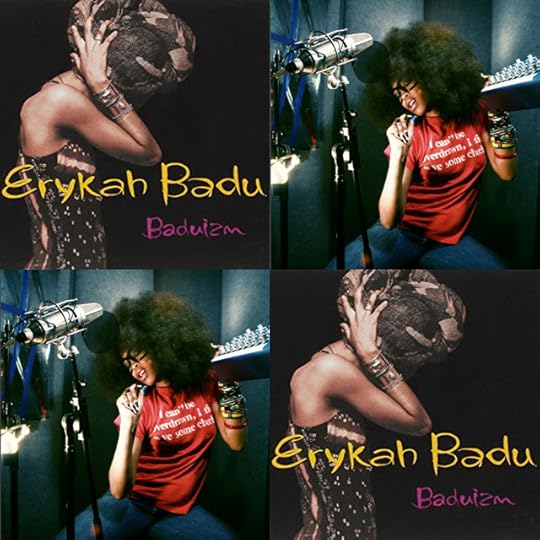“I can’t be overdrawn, I still have some checks”: 'Baduizm' at 20
 “I can’t be overdrawn, I still have some checks”: Baduizm at 20by I. Augustus Durham | @imeanswhatisays | NewBlackMan (in Exile)
“I can’t be overdrawn, I still have some checks”: Baduizm at 20by I. Augustus Durham | @imeanswhatisays | NewBlackMan (in Exile)With understandable teenage angst, I commenced sixth grade. As vividly as that memory remains, I remember preparing for school one morning as 94.3 WYBC provided the soundtrack for my dressing, when “On & On” premiered. No different than when I first heard D’Angelo’s “Brown Sugar”, the record conjures, hypnotizes. There is no other way to explain it but to say: when you first heard that beat drop—bum bum bu bu bu bu bum boom bap—it was as if the video’s juke joint was your bedroom.
Yesterday was Leontyne Price’s 90th birthday and the fact that Baduizm turns 20 years old today, following that nonagenarian milestone, seems more than coincidental when considering an admonition from Price to “sing on your interest, not your capital.” What Baduizm exhibits, to my mind, is that choice.
From start to finish, what jives about the project is its immense black cool, that being Badu performs with a level of ease suggestive that what has been rumored about her eyes translates to her vocal chords: they have special powers. To sing her interest on Baduizm is a calculation which forces listeners to divine what being born underwater with three dollars and six dimes signifies when you play the game of love with a 3000-aire. That maybe we’ll be butterflies—that sounds so divine!—if we run in fields of 4-leaf clovers. That Tyrone has a ho(e) and he takes it everywhere he goes, planting his seed so he reaps what he sows, you know? You know . . .
An archival singer, à la Mark Anthony Neal, Badu cobbles together what one surmises is a greatest hits of the black aesthetic tradition, manufacturing what Hortense J. Spillers refers to as speaking a truer word concerning herself by coining a new term, a self-named –izm which some may deem an illness and still others would call da illest. Whether signposting The Color Purple; having Stevie Wonder paraphernalia, in the form of vinyl, strewn throughout a loft space shared with an educated brother complexly occupied; gesturing to afrofuturism in Motherland 3037 a.d. before we knew the discursive portmanteau was something we had already seen; sampling a Starr in the Atlantic; certainly channeling Billie Holiday and/or Chaka Khan to “Stay” with us for a little while longer; or beckoning “Ye Yo”, “the Black mother within each of us—the poet—[who] whispers in our dreams: I feel, therefore I can be free” (Audre Lorde, “Poetry is Not a Luxury”)—she is a tour guide, a syllabus for the self-determining, a playbill for the drama to which one pays to listen.
The inability to be overdrawn, to still have some checks, proves the existence of capital, cultural and otherwise, such that she lives off the interest. Expendable income made hand over fist. The black cool of Baduizm is that it does not register as work but rather wonder, a marveling at music insofar as although once metered, lined, by maroons, those sounds encounter reinterpretation by the woman who calls herself “the moon”. Yet the album shows only one side of the self. The other side momentarily emerges some 11 years subsequent to Baduizm bowing on to the charts when Badu screams that with age comes understanding game theory. This performance, this convening of chuch—the heavy breathing, often called whooping, that occurs simultaneous to the choir of background singers who comprise the AMEN corner—, allows one to behold what happens when what you do gets good to you, when your song for others transforms to be the testimony of I. The agency to provoke a sonic séance in 14 tracks evokes what may be the album’s subliminal message—despite external forces, you, and who you define yourself to be, is enough—and lends a perspective to what it means to capitalize on that very thing that elicits interest.
Baduizm, as an object of work, is a poorly placed designation: perhaps it is an opportunity for wisdom, an occasion to witness, an obligation to word flesh. A consideration to badu oneself and make one’s own baduizm. To speak one’s name, from verb to noun.
***
I. Augustus Durham (ABD) is a fifth-year doctoral candidate in English at Duke University. His work focuses on blackness, melancholy and genius.
Other essays from I. Augustus Durham:
How “Black” Is Your Science Fiction?
KING Me: Soul for a Black Future
Mr. White! *said in echo*: Charting the Black(ness)
Published on February 11, 2017 11:17
No comments have been added yet.
Mark Anthony Neal's Blog
- Mark Anthony Neal's profile
- 30 followers
Mark Anthony Neal isn't a Goodreads Author
(yet),
but they
do have a blog,
so here are some recent posts imported from
their feed.



